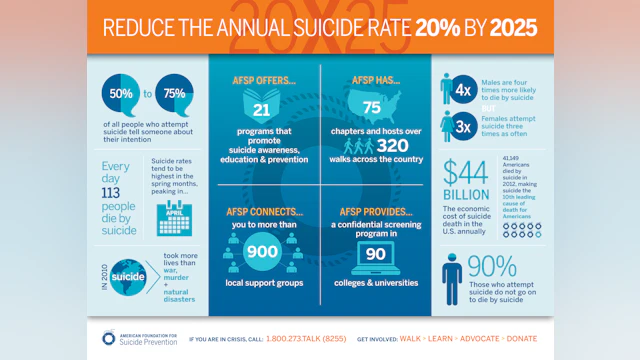More information about Project 2025 coming soon.
NEW YORK (October 27, 2015) – The American Foundation for Suicide Prevention, the largest suicide prevention organization in the United States, has launched Project 2025 to lead a plan of action aimed at the organization’s bold goal of reducing the annual suicide rate 20 percent by 2025.
“AFSP’s programs have always been grounded in research, but Project 2025 marks the first large-scale, comprehensive effort to help us determine where we can reduce suicide through the most promising programs and interventions,” said AFSP CEO Robert Gebbia. “Project 2025 will provide new insights into which strategies can most effectively fight suicide and save lives.”
AFSP has assembled the top minds in the field for the initiative. The team includes Dr. Alan Berman, a leading expert in the field of suicide prevention, and CALIBRE Systems, a firm that specializes in solving complex business challenges, and an advisory committee of industry experts.
“Project 2025 will create a predictability model to determine which prevention methods could have the greatest impact, and establish benchmarks to measure against for the next 10 years,” said Jim Frank, Principal Analyst of CALIBRE Systems, Inc.
Based on the findings, AFSP will develop specific strategies for reducing the rate of suicide, and collaborate with other suicide and mental health organizations, as well as leaders in other industry sectors, to focus their prevention efforts on the kinds of programs, policies and interventions that will save the most lives in the shortest amount of time.
“Suicide has been a major public health issue for some time, but this is the first large-scale analysis of its kind, and the findings have the potential to save tens of thousands of lives within the next 10 years,” said Dr. Alan Berman.
The Project 2025 four-phased approach includes:
Phase 1
Analyze demographics, settings, psychosocial and psychiatric risk factors, and methods of suicide to find where prevention efforts may save the most lives.
Phase 2
Survey the latest research and field data to identify the most effective prevention methods and determine how many lives each method would save when targeted at specific groups and settings with the highest suicide burdens.
Phase 3
Develop a strategy that allocates funding, expertise, and time to the identified prevention methods, and set goals for each, measured in lives saved.
Phase 4
Collaborate with partners across public and private sectors on the prevention methods clarified by this analysis.
The Project 2025 Advisory Committee includes:
- Cathy Barber – Director, “Means Matter” at Harvard University, Research Manager at the Harvard School of Public Health
- Yeates Conwell – Professor and Vice Chair of Psychiatry, Director of the Geriatric Psychiatry Program, Director of the Office for Aging Research and Health Services at the University of Rochester, and AFSP Board President
- David Covington – CEO and President of Recovery Innovations and Co-Chair of “Zero Suicide“
- Alex Crosby – Branch Chief of the Surveillance Branch in the Division of Violence Prevention at the CDC
- Nancy Farrell – AFSP Board Chair and suicide loss survivor
- Robert Gebbia – AFSP CEO
- David Jobes – Professor of Psychology and Associate Director of Clinical Training at Catholic University
- Jan Kemp – Associate Director, Center of Excellence for Suicide Prevention, U.S. Department of Veterans Affairs
- John Mann – Paul Janssen Professor of Translational Neuroscience and Director, Molecular Imaging and Neuropathology Division at Columbia University, and AFSP Board Member
- Richard McKeon – Chief of Suicide Prevention Branch, Division of Prevention, Traumatic Stress, and Special Programs at SAMHSA
- Christine Moutier – AFSP Chief Medical Officer
- Jane Pearson – Chair, NIMH Suicide Research Consortium at National Institute of Mental Health
- Jerry Reed – Vice President and Director at the Center for the Study and Prevention of Injury, Violence and Suicide for the Suicide Prevention Resource Center and the Education Development Center, Inc. at SPRC/Action Alliance
- Dan Reidenberg – Managing Director of the National Council for Suicide Prevention, the Executive Director of SAVE, and the U.S. representative to the International Association of Suicide Prevention
- Phil Satow – Co-Founder and Board Chair of the JED Foundation, and AFSP Board Member
- Barbara Stanley – Professor of Medical Psychology in Psychiatry, Director, Suicide Prevention Training Implementation and Evaluation Program, Center for Practice Innovations, New York State Psychiatric Institute Research Scientist, Molecular Imaging and Neuropathology Division at Columbia University
- Ursula Whiteside – Suicide Researcher and Co-founder of NowMattersNow.org
# # #
The American Foundation for Suicide Prevention is dedicated to saving lives and bringing hope to those affected by suicide. AFSP creates a culture that’s smart about mental health through education and community programs, develops suicide prevention through research and advocacy, and provides support for those affected by suicide. Led by CEO Robert Gebbia and headquartered in New York, with a Public Policy Office in Washington, D.C. AFSP has local chapters in all 50 states and the District of Columbia with programs and events nationwide. Learn more about AFSP in its latest Annual Report, and join the conversation on suicide prevention by following AFSP on Facebook, Twitter, Instagram, and YouTube.
